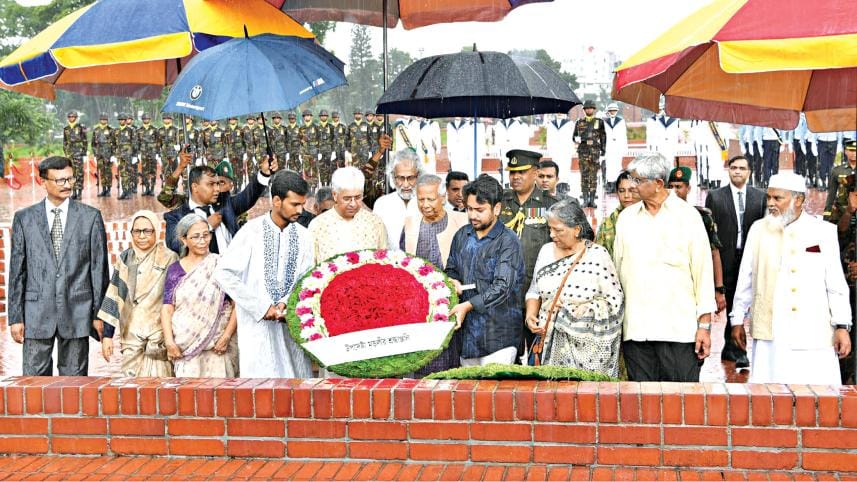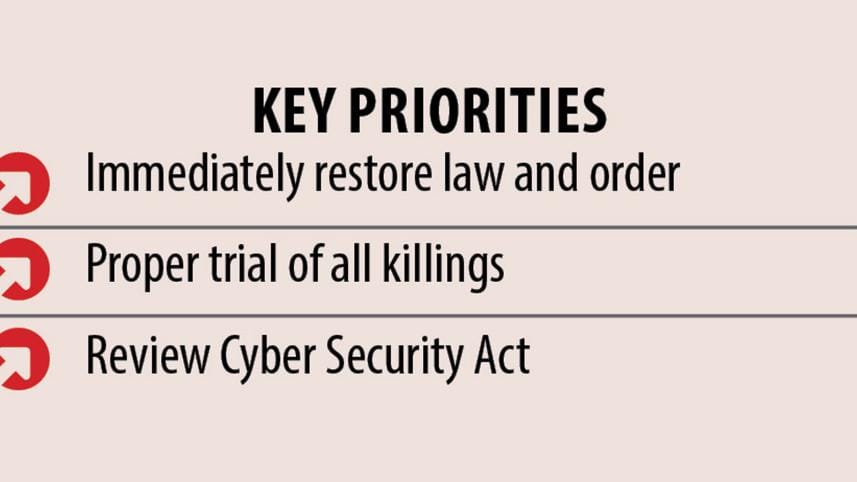Students’ reps to work with ministries

The interim government led by Prof Muhammad Yunus plans to engage more student representatives to assist the advisers and make efforts to immediately improve the law and order situation.
The students are likely to be appointed as "assistant advisers" or something similar, officials said, adding that the details of their involvement in the government would be finalised later.
"The student representatives of the movement will be involved with the advisers in carrying out ministry duties," Syeda Rizwana Hasan told reporters after an unscheduled meeting of the advisory council yesterday, the first day of the government.
"Everyone wants reforms to the system. But people from all walks of life must be consulted before doing that. We will discuss the matter with representatives from all professions, including journalism," said the adviser to the environment, forest and climate change ministry.

The meeting was held in the afternoon at Chief Adviser Prof Yunus' current residence, the state guest house Jamuna in the capital. Earlier in the day, the cabinet division distributed portfolios among the chief adviser and advisers.
Nahid Islam, who was given the charge of telecommunications ministry, said, "The decision to engage more students has been made so that the students can give input and know what the ministries are doing.
"The students have a voice now and they are advocating for state reform. We believe the general public will continue to have faith in young leaders."
The 26-year-old Dhaka University student said the student protests culminated in a mass uprising, resulting in the fall of an autocratic regime -- something the political parties failed to do.
At yesterday's meeting of the advisers, it was decided that cases filed against the student protesters and the politically motivated cases would be reviewed.
They also discussed holding trials in a transparent manner for the killings during the movement so that no such incident would recur in the future, Rizwana said.
"There was a long discussion on how to quickly improve the law and order situation. Everything may not be fixed overnight, but maximum effort is being made to this end," Rizwana said.
The home affairs adviser has been working to normalise the situation in consultation with the inspector general of police and other officials, she added.
Minority communities are still being attacked in some places. Religious groups and locals are being engaged to stop this.
"We all should stand by the police. A force cannot function with a broken morale. Our student representatives, advisers, and police will meet soon."
The chief adviser will bring the family members of the victims of violence during the mass uprising to Dhaka and talk to them.
"The government will assist the families bear the expenses for treatment of the injured," she said, requesting information on such victims.
Prof Yunus, Nahid and Asif will go to Rangpur's Pirganj upazila today to visit the family of Abu Sayed, who was killed in police firing during the quota reform protests on July 16.
She promised necessary measures to resume activities of the judiciary as soon as possible in consultation with senior judges and lawyers.
She said the government would discuss making legal amendments, including to the Cyber Security Act, so that such laws cannot be used to suppress dissent and freedom of expression.
She said educational institutions would be reopened as soon as the law and order situation reaches a satisfactory level.
Resuming the HSC exams will be considered after the reopening.
The meeting also discussed resuming financial activities, bringing changes to the top positions in the sector, and making sure businesses can function in full swing.
Asked about the interim government's tenure, she said they would first need to identify the kind of reforms to be made.
"This interim government will take as much time as it needs to prepare for the beginning of a democratic journey."
Talking about the challenges facing the government, Nahid said the students and the general public need to be united in order to rebuild and reshape Bangladesh.
"The system has largely collapsed. It can be rebuilt if the general people work alongside the administration. These challenges can be overcome quickly."
Earlier in the day, Prof Yunus and other advisers placed wreaths at the National Memorial in Savar and the Central Shaheed Minar.




 For all latest news, follow The Daily Star's Google News channel.
For all latest news, follow The Daily Star's Google News channel. 
Comments